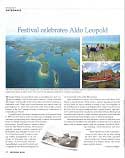Festival Celebrates Aldo Leopold

By Dianna Stampfler
Imagine hiking wooded island trails and paddling the open waters of northern Lake Huron where America’s “father of wildlife ecology” and “founder of the conservation movement” explored as inquisitive youth. To honor the life of one of the area’s most noted summer residents, the third annual Aldo Leopold Festival returns to the Les Cheneaux Islands (including the communities of Cedarville and Hessel), June 2-4.
The Leopold’s purchased a summer cottage on Marquette Island, one of 36 islands that make up the Les Cheneaux archipelago, in 1898. Those summers in the Upper Peninsula sparked Aldo’s lifelong study of nature and shaped his future in wildlife management and environmental preservation.
He went on to earn a master’s degree from the Yale School of Forestry and became regarded as an eminent naturalist, scientist, ecologist, forester, conservationist, environmentalist and philosopher, dedicating 19 years to the U.S. Forest Service and 15 years to teaching wildlife management at the University of Wisconsin. Aldo’s collection of essays, A Sand County Almanac, was published a year after his death and is regarded as one of the most significant environmental works of the 20th century.
Based on family photos, Aldo continued to visit the Les Cheneaux area until about 1919. And although nearly a century as passed since he last set foot there, his legacy remains as strong now as ever before.
In recognition of his extensive contributions to nature, a Michigan historic marker was erected on M-134 during the first year of the Aldo Leopold Festival in 2015. Last summer’s event featured the introduction of the North Huron Birding Trail, which stretches along the rocky shoreline and protected bays from St. Ignace east to Drummond Island.
Festival participants this year can participate in a variety of land and water excursion with Woods & Water Ecotours. Or, walk the trails that meander the nearly 1,700-acre nature preserve on Marquette Island that bears Aldo’s name, maintained by Little Traverse Conservancy.
Free presentations by naturalists and botanists focus on birds of prey, wildflowers, the stars and more. A triathlon, documentaries, farmer and artisan markets, dark sky programs, birdhouse building workshops, a community picnic and a weekend-long scavenger hunt are among other events planned.
“These experiences make vivid impressions, as they surely did on Aldo during his time here,” says Amy Polk, executive director of the Les Cheneaux Islands Tourist Association. “The Aldo Leopold Festival is a celebration of Les Cheneaux as a natural and wild place, where one can still look at the landscape the way Aldo did nearly 100 years ago.”
For a schedule of events for the 2017 Aldo Leopold Festival, visit lescheneaux.org/aldo-leopold or for more on Aldo’s history, visit aldoleopold.org.
MICHIGAN HISTORICAL MARKER
Side 1
In 1898, Carl Leopold purchased a summer cottage on Marquette Island, visible from here across Mackinac Bay. His family, including his son Aldo, traveled there each summer from their home in Iowa. Aldo’s summers on the island were the start of a lifetime dedicated to the study of nature. His professional career included nineteen years with the U.S. Forestry Service and fifteen years at the University of Wisconsin teaching wildlife management. In his book A Sand County Almanac and Sketches Here and There, Leopold defined his concept of a land ethic. He believed that people were stewards of the land and that the natural environment should be view as a community, not a commodity.
Side 2
As a young man, conservationist Aldo Leopold (1887-1948) explored the Les Cheneaux area with family and friends. His brother Frederic wrote, “Aldo knew most of the island intimately. He produced several handmade maps artistically decorated and illuminated with typical trees, animals and birds in appropriate places, all of the trails were shown including some newer trails which he himself created.” Leopold continued to visit the Les Cheneaux area after his graduation from Yale Forestry School in 1909. As a prolific author, researcher and educator whose words still influence the field, Aldo Leopold is widely considered to be a founder of the conservation movement in America.
Reprinted from the Spring 2017 issue of Michigan BLUE Magazine.
